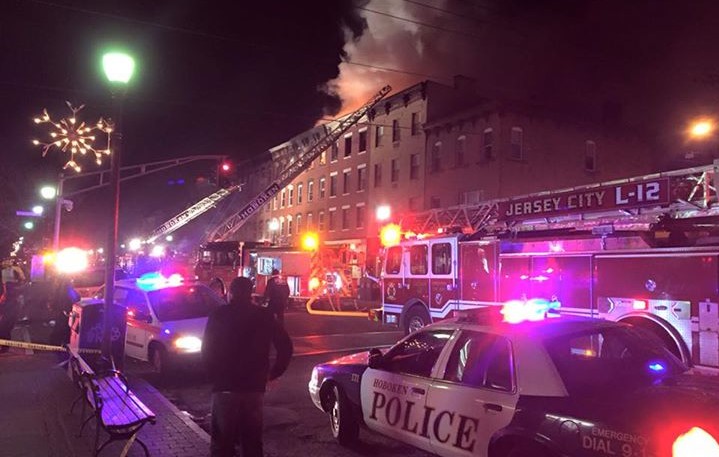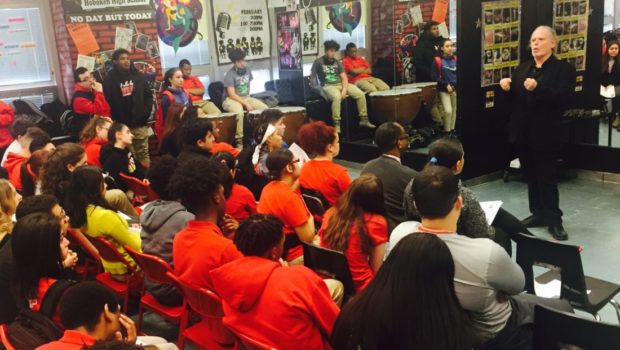
DOUBLE-DOWN: Substantial Fiscal Woes Come to Light in Hoboken
by Christopher Halleron
Hoboken’s budget woes appear to be significantly larger than originally thought, as a nearly $7.5 million increase in expenditures is met by a projected decrease in the municipal surplus regeneration for 2019 by what could be as high as $6.5 million. When added together, those numbers represent quite a hole for Hoboken to fill as they prepare to work on the 2020 budget.
These numbers came to light at the City Council meeting on February 5, when representatives began debating a series of proposed hikes in parking fees and fines, all of which were passed 5-4. During the exchanges, Second Ward Councilwoman Tiffanie Fisher made it known that she was supporting the initiative because, “the city does very specifically rely on parking revenue to balance its annual budget. And what we’re seeing this year is, it’s not a $7 million deficit, it’s potentially closer to $14 million. It’s a giant number.”
In a December 17, 2019 memo obtained by hMAG to Mayor Ravi Bhalla from the City’s Business Administrator Stephen Marks, the outlook for Hoboken’s financial position is outlined—highlighting a combination of healthcare costs ($1,513,450), elevated pension costs ($578,345), and anticipated annual salary increases in the face of collective bargaining negotiations with the City’s six municipal labor unions ($3,200,000).
Those increases are being met by anticipated revenue shortfalls on court fines, investments, debt service increase (bond repayments), departmental budget increases, higher waste disposal fees, and an increase in New Jersey’s Joint Insurance Fund premiums.
According to Marks, “The grand total for anticipated increases for personnel costs and other expenses is $7,420,795,” adding “which does not include the impact of the projected decrease in the municipal surplus regeneration.”
SURPLUS MINUS
On Friday, hMAG met with representatives from City Hall to learn more about the dent in the municipal surplus. Mayor Bhalla was not present, but City Spokesman Vijay Chaudhuri, Director of Operations Jason Freeman and Business Administrator Stephen Marks (who announced last week that he’d be leaving his position in Hoboken to take the Business Administrator position in his current hometown of Kearny) gave their account of how the surplus has been impacted.
As explained by the City officials with whom we met, the “surplus” is just that—it’s what remains from the projected budget after all expenses are met. Over time, that surplus accumulates and creates a significant amount of money—essentially a municipal savings account/rainy day fund, which can be used by the City to cover shortfalls, unexpected expenditures or catastrophic events (i.e. storm damage).
“This Mayor has been much more intentional about trying to budget accurately,” said Freeman. “For example, if something is going to cost $550,000, we’re not going to budget $800,000 for it knowing we’re only going to spend $550,000.”
Marks termed the practice as, “Rightsizing each account, each line item,” adding “we’re trying to ensure that taxpayers don’t pay more than they absolutely have to.”
Meanwhile, the City has been drawing from the surplus to cover expenses. Typically those funds are restored via revenue streams such as the Hoboken Parking Utility (HPU), municipal court fees, permit fees. In Hoboken, those revenue streams have slowed significantly. State initiatives on court reform have also made an impact.

Hoboken Parking Utility in action
HPU’s contribution comes from it’s own operating surplus. Once HPU’s expenses are covered, a significant portion is then passed on to the City. For 2019, that number is down from approximately $4.5 million to $3.2 million.
“We used $11.5 million of the surplus as revenue last year,” said Marks, “we had regenerated $5.5 million during 2019. So the question is how much surplus should we use in the budget this year?”
With a much lower 2019 year-end surplus balance, that question becomes a big focus of the budget debates to come. Using less of the surplus will require money to come from somewhere, and those concerns are over and above the $7.5 million increase in expenditures. If the City maintains a policy that it can’t use more surplus than it generated in the prior year, that additional budget gap surpasses $6 million. These combines concerns are the basis behind Tiffanie Fisher’s comment that the budget gap could be as high as $14 million.
Some members of the City Council will advocate using that surplus now, in the face budget discussions in what will be a challenging and highly charged political atmosphere over the next few months. The narrow decision to increase parking rates is a good indication of what lies ahead.
“We were asked by the administration to consider that change now,” said Fisher, explaining her vote in favor of the move on February 5. “The timing of this decision is so we can get revenue into the budget this year.”
Fisher has chaired the Revenue, Finance and Infrastructure subcommittee for the past four years. In a statement on January 27, she said, “Filling any size budget gap can come from a variety of sources including reducing operating costs, layoffs, increasing revenues and increasing taxes. The city is considering all of the above.”
As for using the entirety of the surplus, Chaudhuri warns against leaning on that too much, saying, “While it may get us through 2020, we’d be jeopardizing the long-term financial health of the City, and the Mayor’s not willing to do that.”
At risk is the City’s bond Rating, which has been improved and maintained over the past few years after a period of economic volatility in the last decade. In 2008, Moody’s gave Hoboken a rating just above junk bonds, citing, “significant deferred charges, annual cash flow borrowing, and a history of financial mismanagement,” in its assessment of the Mile Square City’s finances. Since then, City Hall (the Administrations and City Council) have worked to achieve a AA+ rating from Standard & Poors—that firm’s second highest rating. In order to maintain such a rating, the City must in turn maintain a substantial surplus of cash on hand.
Third Ward Councilman Mike Russo, who voted against the parking rate hikes, took to social media to voice his displeasure with the present fiscal situation.
“This is crazy!!” exclaimed Russo, “How many times can you go to the well?!!!”
Russo, who has an established track record of opposition to tax and fee increases, went on to say, “Residents are facing an increase in their water rates, an increase in the open space tax, the special assessment for the newly created Special Improvement District, increased residential parking permits, increased costs for parking violations, increased parking meter rates, increased fees across the board,” adding, “and most significantly a potential 25% tax increase if we truly have a $14,000,000.00 short fall!”
While state laws put a cap on the amount that a municipality can increase its taxes, Hoboken has begun the process of evaluating layoffs—as many as 80 of the City’s current 550 full-time employees—as a way to address the issues.

Hoboken Fire and Hoboken Police Departments are joined by Jersey City Fire Department battling a blaze in February of 2016.
CITY EMPLOYEES
“The layoff plan is an absolutely worst-case scenario,” said Freeman. When asked how close we are to that possibility, his response was, “we won’t know.”
Marks added, “I think if everybody is willing to meet in the middle, the municipal government is going to be fine. Where the municipal government will not be fine is where people go to their corners and refuse to meet in the middle. Then people are going to be hurt.”
Finding a consensus moving forward will be a challenge. Negotiations continue with labor unions, hinging primarily on a trade-off between salary increases and what the City paints as modest reductions in healthcare coverage.
The Mayor’s staff, which does not benefit from the municipal union, has been a bone of contention among a number of City Council members. Some feel the office has grown excessively, while those within the administration argue that the number of staffers is below norms across the state.
When asked directly if Administration staff are among those facing layoff or loss of job, Freeman responded, “Everything is on the table,” adding, “we have tried very very hard—whether people believe it or not—to mitigate costs.”
In the wake of departures from the Administration, there have been a number of shuffles in staffing. “Right now, we are at the same level of staffing as [former Hoboken Mayor] Dawn [Zimmer],” said Chaudhuri.
TAKING INITIATIVES
When asked about the impact of Hoboken’s numerous park initiatives, and their impact on the municipal budget, Chaudhuri responded, “those are being built with low interest loans and with money from the Open Space Trust Fund. There’s no impact on the municipal budget.”

Officials break ground at Hoboken’s Northwest Park (City of Hoboken photo)
As for Hoboken’s road construction and Vision Zero initiatives, Chaudhuri said, “The large majority of those are being installed as we repave the roads. We’ve gotten $2.5 million from the DOT for the purpose of road repaving.” When asked specifically about any extra cost for the bumpouts, Marks added, “it’s a small, incremental cost—probably one or two percent more than if you didn’t do the bumpouts.”
These are among the more publicly scrutinized initiatives taking up share of mind among those engaged with civic issues in Hoboken.
“These big ticket items, we’re budgeting for them smartly,” says Chaudhuri. “We’re not just raiding the municipal budget, and I’d challenge anyone to look line by line by line to pick out a pet project.”
WHAT’S THE ANSWER
Since Hoboken’s cash flow problems stem from a variety of issues, they will require a variety of different answers—all of which will only come after asking a lot of hard questions.
While the city’s revenue from rateable property tax has grown by $793,732 from 2019 to 2020, Hoboken’s tax rate has not changed significantly over the past decade. Last year’s tax increase saw some fairly acrimonious debate in City Council, and that was only 1.66%.
“We’re going to explore all ways to cut costs, and we’re going to do so with a deliberate approach,” said Chaudhuri. “This is a tough year. We may face a tax increase, but we’d rather have that small tax increase than use up all the surplus and jeopardize the financial stability of the City.”
With budget workshopping on the agenda for the months to come, Chaudhuri added, “Everyone needs to come to the table and be a team player.”
***

 Previous Article
Previous Article Next Article
Next Article THIS SHOW SHOULD BE PLAYED LOUD: White Eagle Hall Hosts “The Last Waltz”—Friday, November 16th
THIS SHOW SHOULD BE PLAYED LOUD: White Eagle Hall Hosts “The Last Waltz”—Friday, November 16th  BILL’S SPACE SHOW: Episode Two — Overlake, the Space Boys and Host William James Hamilton
BILL’S SPACE SHOW: Episode Two — Overlake, the Space Boys and Host William James Hamilton  TAKE A LOAD OFF: “The Last Waltz” Brings The Weight of Area Music Talent Together @ White Eagle Hall — Saturday, November 23rd
TAKE A LOAD OFF: “The Last Waltz” Brings The Weight of Area Music Talent Together @ White Eagle Hall — Saturday, November 23rd  Grow-Boken: Optimizing Your Hoboken Green Space
Grow-Boken: Optimizing Your Hoboken Green Space  THE GUNS FELL SILENT: Hoboken Veterans Day Commemorates the Centennial of World War I — PHOTO GALLERY
THE GUNS FELL SILENT: Hoboken Veterans Day Commemorates the Centennial of World War I — PHOTO GALLERY  FORTUNE: Hoboken High School Honors Black History Month with Playwright George Cameron Grant
FORTUNE: Hoboken High School Honors Black History Month with Playwright George Cameron Grant  CARRY ON: Your Hoboken Plastic Bag Ban Survival Guide
CARRY ON: Your Hoboken Plastic Bag Ban Survival Guide  RIGHT IN TUNE, RIGHT IN TOWN: As Black Friday Approaches, Longtime Hoboken Record Store Tunes Still Changes With the Times
RIGHT IN TUNE, RIGHT IN TOWN: As Black Friday Approaches, Longtime Hoboken Record Store Tunes Still Changes With the Times